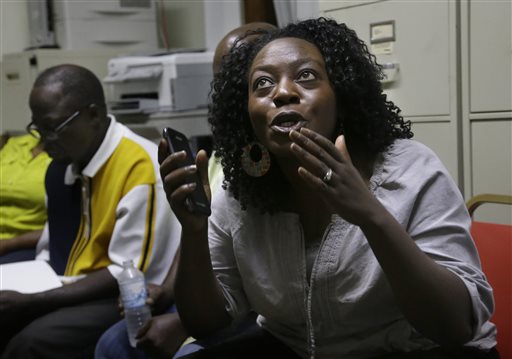
In this Wednesday, Oct. 8, 2014 photo Kormasa Amos, of Providence, R.I., right, an organizer in the campaign “Ebola be Gone,” addresses a meeting of the Liberian Community Association of Rhode Island, in Providence, R.I. AP
MANILA, Philippines – The Department of Foreign Affairs (DFA) is preparing to implement voluntary repatriation measures in West Africa Countries with an outbreak of Ebola by mid-November.
“The Philippine Government is undertaking all necessary measures to protect the health and preserve the well-being of our nationals in keeping with the established protocols on managing the Ebola Virus Disease (EVD),” DFA Secretary Albert del Rosario said in a statement Monday.
“This includes preparations for raising the Crisis Alert Level to 3 for the Ebola affected countries in West Africa effective mid-November 2014,” he said.
Currently, there are 1,979 Filipinos in Sierra Leone, 880 in Guinea and 632 in Liberia.
DFA had previously announced plans to impose mandatory repatriation through raising the Alert Level to 4.
The three worst hit countries are currently under Alert Level 2, urging Filipinos to undertake precautionary measures and banning newly hired overseas Filipino workers from travelling there.
Many OFW there, mostly professionals, complained to DFA about the mandatory repatriation plan saying it would affect their jobs.
They said they are not at risk of contracting the disease because they don’t work in the health sector.
More than 8,000 cases of Ebola have already been reported by the World Health Organization with nearly half succumbing to it.
Ebola is transmitted through direct physical contact with bodily fluids of an infected person such as vomit, urine, feces, saliva, semen, and blood.
RELATED STORIES
First US Ebola infection sparks fears about safety protocols


